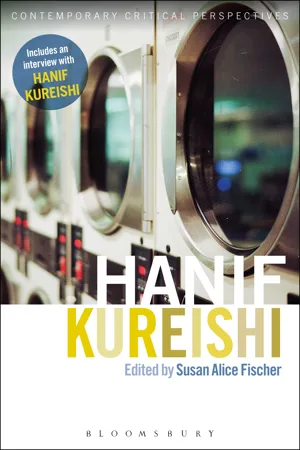
- 208 pages
- English
- PDF
- Available on iOS & Android
About This Book
Since his astonishing Academy Award-nominated film, My Beautiful Laundrette (1985), Hanif Kureishi has been recognized as a major writer who has both documented and profoundly influenced contemporary British culture. His first novel, The Buddha of Suburbia (1990), remains a key work in redefining our sense of what it means to be English in the postcolonial era. Hanif Kureishi: Contemporary Critical Perspectives brings together leading scholars of contemporary British fiction and culture to reassess the full range of the author's writings, from novels such as The Black Album, My Son the Fanatic and Something to Tell You to films such as Sammy and Rosie Get Laid, My Son the Fanatic and Venus. As well as exploring Kureishi's handling of such themes as Thatcherism, terrorism, race, class and sexuality, the book move moves beyond sociological and psychoanalytical approaches, examining the stylistic features of his most recent novel, The Last Word. The volume includes interviews with Stephen Frears, the director of My Beautiful Launderette, and with Hanif Kureishi himself, as well as a foreword by Roger Michell, who has directed several of the author's screenplays, most recently Le Week-End.
Frequently asked questions
Information
Table of contents
- Title Page
- Copyright Page
- Contents
- Foreword
- Series editors’ preface
- Acknowledgments
- Contributors
- Hanif Kureishi: A chronology
- Introduction
- Chapter 1 The enigma of abandonment: Rethinking Hanif Kureishi’s importance for multiculturalism
- Chapter 2 “I believe my eyes”: The transformative cinema of Hanif Kureishi
- Chapter 3 Culture and anarchy in Thatcher’s London: Hanif Kureishi’s Sammy and Rosie Get Laid
- Chapter 4 “The suburbs that did it”: Hanif Kureishi’s The Buddha of Suburbia and metropolitan multicultural fiction
- Chapter 5 Hanif Kureishi’s “better philosophy”: From The Black Album and My Son the Fanatic to The Word and the Bomb
- Chapter 6 The parallax of aging: Hanif Kureishi’s The Body
- Chapter 7 The other Kureishi: A psychoanalytic reading of Something to Tell You
- Chapter 8 The Last Word on Hanif Kureishi
- Interview “A very serious business”: Hanif Kureishi in conversation with Susan Alice Fischer
- Interview “An extraordinary encounter”: Stephen Frears in conversation with Susan Alice Fischer and Deanna Kamiel
- References
- Further reading
- Index